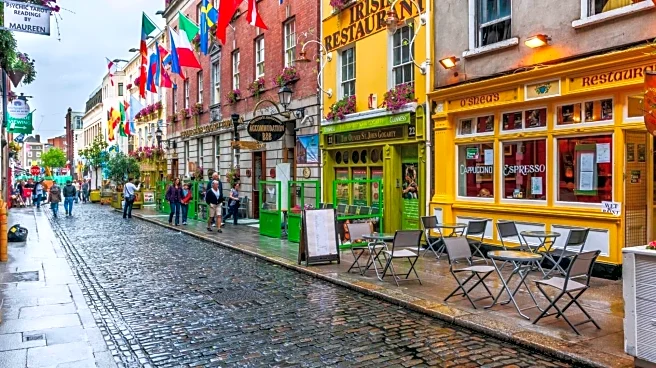What is the story about?
Airbnb Inc. issued a better-than-expected outlook for the holiday quarter, with a recently launched “reserve now, pay later” feature helping fuel demand in the US.
Revenue for the three months ending Dec. 31 will be $2.66 billion to $2.72 billion, the company said in a shareholder letter on Thursday, exceeding the Bloomberg-compiled analyst average estimate of $2.67 billion.
The key metric of nights and seats booked is expected to increase in the “mid-single-digit range” from a year earlier, Airbnb said. That was in line with analysts’ estimates. Airbnb had previously warned about challenging comparisons with 2024.
“In October, we continued to see strong demand despite more difficult year-over-year comparisons,” Airbnb said in the letter. American travelers are using its “reserve now, pay later” feature launched in August for US rentals to book trips earlier, it added, supporting its “positive outlook for the rest of the year.”
Shares of Airbnb rose 5.5% in extended trading after closing at $120.53. The stock had been down 8.3% so far this year.
Airbnb’s report echoes a rosy forecast provided by online travel peer Booking Holdings Inc., which cited resilient demand across all regions. And Expedia Group Inc. raised its full-year gross bookings and revenue outlook on Thursday. It also posted third-quarter results that broadly beat expectations.
Even so, there are lingering concerns about the US government shutdown and its effect on travel. Planned cuts to flight capacity threaten to cause disruptions during the upcoming holiday season.
In the third quarter, Airbnb saw a pickup in reservations growth thanks to North American travellers, who contributed about 30% of total nights booked, according to the company. It observed strong domestic travel and trips with longer lead times due in part to the deferred payment feature. All of this may offer some assurance to investors as concerns remain about the overall health of US consumer spending.
The “reserve now, pay later” option could lead to some cancellations closer to the date of stay, which may or may not occur in the same quarter, Airbnb said. But it expects “a net benefit to overall bookings” based on its prior testing, and plans to continue rolling it out more broadly to additional customers in the coming months.
Reservations in Airbnb’s new international markets drove most of its gains. First-time bookers increased more than 20% in Japan and nearly 50% in India from a year ago, the company said, adding that overall nights booked would have increased by double-digits had North America not weighed on the total.
In the third quarter, total nights and seats booked exceeded expectations, increasing 8.8% to 133.6 million. Revenue was $4.1 billion, ahead of estimates. Adjusted earnings before interest, taxes, depreciation and amortization for the period came to $2.1 billion, also beating Wall Street’s projections.
The company didn’t break out results for its experiential business or its a la carte services category that it launched in May. But Airbnb said the products are attracting new users to the platform, including locals. Almost half of experiences bookings weren’t attached to an Airbnb accommodations reservation, the company added.
The strong results overshadowed a miss in the company’s third-quarter net income as it continues to invest in new artificial intelligence features, international markets, lobbying efforts, and experiences and services. Some of those growth opportunities may take years to become material businesses. Net income was $1.37 billion during the period, compared with an estimated $1.46 billion.
For the full year, Airbnb now expects its adjusted earnings margin to be about 35%, an increase from its August guidance of “at least 34.5%.”
“As we look forward to 2026, we are focused on maintaining strong margins while continuing to invest in growth initiatives,” the company said in the letter.
One of those new focuses will include partnering with hotels in markets where short-term rentals are falling short of customer demand, Chief Executive Officer Brian Chesky told analysts on a call Thursday. It has launched a pilot program with boutique and independent hotels in Los Angeles, New York City and Madrid, he said.
Looking ahead, Chesky said the company will learn from its hotel pilot and the introduction of experiences and services — and use that information to test and debut new product segments.
“We are on pace to every year having at least a new business,” he said, adding that the company may have multiple pilots in parallel before deciding to expand on one. For example, Airbnb’s premium rental category, Luxe, is “a big opportunity,” he said.
“Our theory is that every incremental new business we launch is going to be more efficient to launch than prior businesses,” he said.
Read Also: Gold little changed as traders eye outlook for US Fed interest rates
Revenue for the three months ending Dec. 31 will be $2.66 billion to $2.72 billion, the company said in a shareholder letter on Thursday, exceeding the Bloomberg-compiled analyst average estimate of $2.67 billion.
The key metric of nights and seats booked is expected to increase in the “mid-single-digit range” from a year earlier, Airbnb said. That was in line with analysts’ estimates. Airbnb had previously warned about challenging comparisons with 2024.
“In October, we continued to see strong demand despite more difficult year-over-year comparisons,” Airbnb said in the letter. American travelers are using its “reserve now, pay later” feature launched in August for US rentals to book trips earlier, it added, supporting its “positive outlook for the rest of the year.”
Shares of Airbnb rose 5.5% in extended trading after closing at $120.53. The stock had been down 8.3% so far this year.
Airbnb’s report echoes a rosy forecast provided by online travel peer Booking Holdings Inc., which cited resilient demand across all regions. And Expedia Group Inc. raised its full-year gross bookings and revenue outlook on Thursday. It also posted third-quarter results that broadly beat expectations.
Even so, there are lingering concerns about the US government shutdown and its effect on travel. Planned cuts to flight capacity threaten to cause disruptions during the upcoming holiday season.
In the third quarter, Airbnb saw a pickup in reservations growth thanks to North American travellers, who contributed about 30% of total nights booked, according to the company. It observed strong domestic travel and trips with longer lead times due in part to the deferred payment feature. All of this may offer some assurance to investors as concerns remain about the overall health of US consumer spending.
The “reserve now, pay later” option could lead to some cancellations closer to the date of stay, which may or may not occur in the same quarter, Airbnb said. But it expects “a net benefit to overall bookings” based on its prior testing, and plans to continue rolling it out more broadly to additional customers in the coming months.
Reservations in Airbnb’s new international markets drove most of its gains. First-time bookers increased more than 20% in Japan and nearly 50% in India from a year ago, the company said, adding that overall nights booked would have increased by double-digits had North America not weighed on the total.
In the third quarter, total nights and seats booked exceeded expectations, increasing 8.8% to 133.6 million. Revenue was $4.1 billion, ahead of estimates. Adjusted earnings before interest, taxes, depreciation and amortization for the period came to $2.1 billion, also beating Wall Street’s projections.
The company didn’t break out results for its experiential business or its a la carte services category that it launched in May. But Airbnb said the products are attracting new users to the platform, including locals. Almost half of experiences bookings weren’t attached to an Airbnb accommodations reservation, the company added.
The strong results overshadowed a miss in the company’s third-quarter net income as it continues to invest in new artificial intelligence features, international markets, lobbying efforts, and experiences and services. Some of those growth opportunities may take years to become material businesses. Net income was $1.37 billion during the period, compared with an estimated $1.46 billion.
For the full year, Airbnb now expects its adjusted earnings margin to be about 35%, an increase from its August guidance of “at least 34.5%.”
“As we look forward to 2026, we are focused on maintaining strong margins while continuing to invest in growth initiatives,” the company said in the letter.
One of those new focuses will include partnering with hotels in markets where short-term rentals are falling short of customer demand, Chief Executive Officer Brian Chesky told analysts on a call Thursday. It has launched a pilot program with boutique and independent hotels in Los Angeles, New York City and Madrid, he said.
Looking ahead, Chesky said the company will learn from its hotel pilot and the introduction of experiences and services — and use that information to test and debut new product segments.
“We are on pace to every year having at least a new business,” he said, adding that the company may have multiple pilots in parallel before deciding to expand on one. For example, Airbnb’s premium rental category, Luxe, is “a big opportunity,” he said.
“Our theory is that every incremental new business we launch is going to be more efficient to launch than prior businesses,” he said.
Read Also: Gold little changed as traders eye outlook for US Fed interest rates
/images/ppid_59c68470-image-176248010031590009.webp)



/images/ppid_59c68470-image-177098254670211340.webp)












